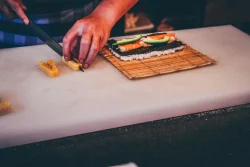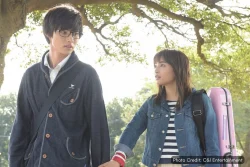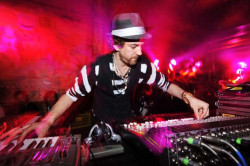
July 28, 2011
Fishbone
With a new rock doc and album, is it finally the LA warhorse’s moment?
Originally published on metropolis.co.jp on July 2011

Gwen Stefani, Flea, Perry Farrell…the list of interviewees in the documentary Everyday Sunshine: The Story of Fishbone who cite the band as an influence is a who’s who of American rock from the last two decades.
“They brought the punk to the funk,” declaims narrator Laurence Fishburne, stating succinctly how Fishbone smashed color lines in 1980s Los Angeles and paved the way for the success of bands like No Doubt, the Red Hot Chili Peppers and Jane’s Addiction.
But later on, Les Claypool of Primus raises the central issue of the movie when he states, “They should have been the band that went way beyond any of us who were influenced by them.”
The obvious answer to the question of why Fishbone was eclipsed by its contemporaries is race. Where white bands influenced by black music like the Chili Peppers connected with vast swathes of white suburbia, all-black rock act Fishbone remained a cult act.
We raise this question with Fishbone founders, singer Angelo and bassist Norwood Fisher. “From my perspective as a black man living in a white-dominated America, racism in the American music business has definitely kept bands like Fishbone from having a fair chance in being evenly exposed to the masses because of cultural stereotypes placed upon them by white power figures,” answers Angelo by email.
“When me and Flea go surfing, I know that his bank account outdistances mine by a long shot,” Fisher adds in a phone call to a recording studio in Richmond, Virginia “But that’s not all of it. We are a band of hardheads and we’re still hardheaded today. The bottom line is that over the years Fishbone was fucking up, and right at the time when things could have paid off greatly, the band imploded.”
In tragicomic scenes reminiscent of the Ramones or Anvil films, the movie digs into the gruesome details of the band’s numerous difficulties. These include Fisher’s 1993 arrest for kidnapping when he attempted to help guitarist Kendall Jones, who had quit Fishbone after suffering from mental instability.
Following the release of Truth and Soul—their definitive 1988 mash-up of punk, funk, ska and metal—Fishbone’s trajectory had been an upward arc. With unbridled front man Angelo leading the circus and Fisher the rock-solid anchor, they’d left their uncomprehending South Central ghetto behind and crossed into the mainstream, touring with Lollapalooza and even playing Japan.
But the kidnapping fiasco led Sony to drop them, and though they continued to perform and record for a dedicated fan base, Fishbone sank under the horizon for years. Now, however, with Everyday Sunshine (named after one of their trademark party anthems), a new album in the works, a new lineup and renewed attention from Japan, is it Fishbone’s time again?
“There are a lot of people rediscovering the band, and there has always been an influx of new fans,” muses Fisher. “It’s nice to be discovered 25 years after your first record, to be brand new to somebody. We were fortunate enough to have been able to do good tours, and to keep putting out new records. And thankfully the Internet allows people to discover us in the comfort of their own smartphones.”
As a new generation eats up the cultural mash-up of Fuji Rock performers Big Audio Dynamite, what they’ll find in Fishbone—slated to appear at Tokyo Ska Paradise Orchestra’s Tokyo Ska Jamboree and two dates in Tokyo—is something near in spirit if not quite sound. Both bands were essential to the smashing of color lines that took place on both sides of the Atlantic in the post-punk era.
“We were teenagers being influenced by what we were hearing, which was reggae being played on black radio in Los Angeles for the first time,” Fisher recalls. “I remember the day we were jamming on reggae rhythms—punk rock was new at that time too—and we just started speeding stuff up. Honestly, in 1979 I didn’t know what ska was, and I thought we’d invented something new.”
White punks from London to LA, and blacks from Brixton to South Central were all looking across color barriers. “We were six black young men from Los Angeles, and the Two Tone idea was something to stand for, so we totally embraced it,” Fisher recalls. “And the energy of punk rock—you know we came from gang-related neighborhoods, so for me the violence of punk made sense. There was a big cross-cultural surge, everybody was listening to everything—mod and ska and new wave—everybody could enjoy it, and for a moment it didn’t matter what color you were.”
Angelo has never shied away from controversy—taking on race, war and all manner of injustice in his lyrics—but sometimes it’s his more personal subject matter that strikes listeners most. The title track for Fishbone’s forthcoming new album Crazy Glue looks at the dysfunctional, codependent relationship between the mercurial Angelo and the taciturn Fisher.
“The title track is my favorite,” Fisher says about the album, which is due out in October. “I think Angelo wrote some brilliant, honest lyrics, that really describe he and I and our internal conflicts with each other.”
Now that they’re both forty-something dads, haven’t they slowed down a bit? “Nah man, it’s still crazy as fuck to be in Fishbone,” he laughs. “But it’s ok. Nobody said this shit would be easy. And really I just look at it like, there’s nothing saying that things should not be the way they are. As long as we can make music and love each other through troubled times it’s all good.”
O-Nest, Aug 6; O-East, Aug 7 (listing); Tokyo Ska Jamboree, Aug 8 (listing)







